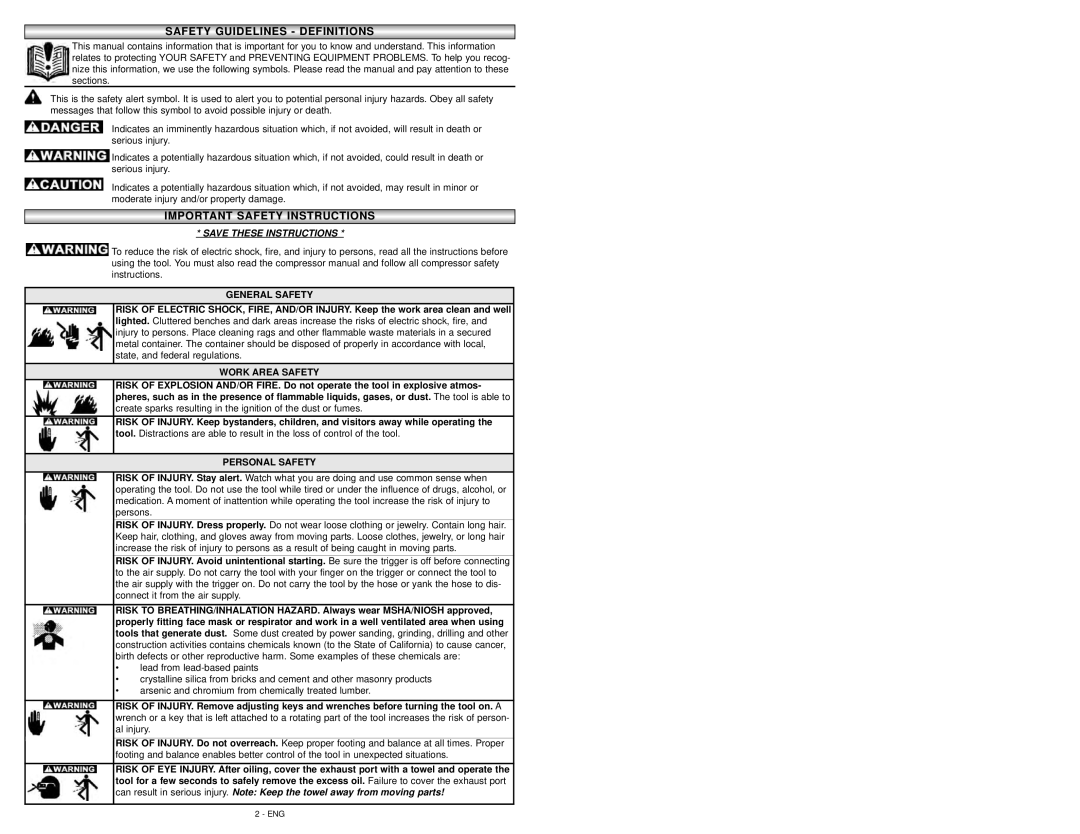
SAFETYSAFETY GUIDELINESGUIDELINES -- DEFINITIONSDEFINITIONS
This manual contains information that is important for you to know and understand. This information relates to protecting YOUR SAFETY and PREVENTING EQUIPMENT PROBLEMS. To help you recog- nize this information, we use the following symbols. Please read the manual and pay attention to these sections.
This is the safety alert symbol. It is used to alert you to potential personal injury hazards. Obey all safety messages that follow this symbol to avoid possible injury or death.
Indicates an imminently hazardous situation which, if not avoided, will result in death or serious injury.
![]() Indicates a potentially hazardous situation which, if not avoided, could result in death or serious injury.
Indicates a potentially hazardous situation which, if not avoided, could result in death or serious injury.
Indicates a potentially hazardous situation which, if not avoided, may result in minor or moderate injury and/or property damage.
IMPORTIMPORTANTANT SAFETYSAFETY INSTRUCTIONSINSTRUCTIONS
* SAVE THESE INSTRUCTIONS *
![]() To reduce the risk of electric shock, fire, and injury to persons, read all the instructions before using the tool. You must also read the compressor manual and follow all compressor safety instructions.
To reduce the risk of electric shock, fire, and injury to persons, read all the instructions before using the tool. You must also read the compressor manual and follow all compressor safety instructions.
GENERAL SAFETY
![]() RISK OF ELECTRIC SHOCK, FIRE, AND/OR INJURY. Keep the work area clean and well lighted. Cluttered benches and dark areas increase the risks of electric shock, fire, and injury to persons. Place cleaning rags and other flammable waste materials in a secured metal container. The container should be disposed of properly in accordance with local, state, and federal regulations.
RISK OF ELECTRIC SHOCK, FIRE, AND/OR INJURY. Keep the work area clean and well lighted. Cluttered benches and dark areas increase the risks of electric shock, fire, and injury to persons. Place cleaning rags and other flammable waste materials in a secured metal container. The container should be disposed of properly in accordance with local, state, and federal regulations.
WORK AREA SAFETY
![]() RISK OF EXPLOSION AND/OR FIRE. Do not operate the tool in explosive atmos- pheres, such as in the presence of flammable liquids, gases, or dust. The tool is able to create sparks resulting in the ignition of the dust or fumes.
RISK OF EXPLOSION AND/OR FIRE. Do not operate the tool in explosive atmos- pheres, such as in the presence of flammable liquids, gases, or dust. The tool is able to create sparks resulting in the ignition of the dust or fumes.
RISK OF INJURY. Keep bystanders, children, and visitors away while operating the tool. Distractions are able to result in the loss of control of the tool.
PERSONAL SAFETY
RISK OF INJURY. Stay alert. Watch what you are doing and use common sense when operating the tool. Do not use the tool while tired or under the influence of drugs, alcohol, or medication. A moment of inattention while operating the tool increase the risk of injury to persons.
RISK OF INJURY. Dress properly. Do not wear loose clothing or jewelry. Contain long hair. Keep hair, clothing, and gloves away from moving parts. Loose clothes, jewelry, or long hair increase the risk of injury to persons as a result of being caught in moving parts.
RISK OF INJURY. Avoid unintentional starting. Be sure the trigger is off before connecting to the air supply. Do not carry the tool with your finger on the trigger or connect the tool to the air supply with the trigger on. Do not carry the tool by the hose or yank the hose to dis- connect it from the air supply.
RISK TO BREATHING/INHALATION HAZARD. Always wear MSHA/NIOSH approved, properly fitting face mask or respirator and work in a well ventilated area when using tools that generate dust. Some dust created by power sanding, grinding, drilling and other construction activities contains chemicals known (to the State of California) to cause cancer, birth defects or other reproductive harm. Some examples of these chemicals are:
•lead from
•crystalline silica from bricks and cement and other masonry products
•arsenic and chromium from chemically treated lumber.
RISK OF INJURY. Remove adjusting keys and wrenches before turning the tool on. A wrench or a key that is left attached to a rotating part of the tool increases the risk of person- al injury.
RISK OF INJURY. Do not overreach. Keep proper footing and balance at all times. Proper footing and balance enables better control of the tool in unexpected situations.
![]() RISK OF EYE INJURY. After oiling, cover the exhaust port with a towel and operate the tool for a few seconds to safely remove the excess oil. Failure to cover the exhaust port can result in serious injury. Note: Keep the towel away from moving parts!
RISK OF EYE INJURY. After oiling, cover the exhaust port with a towel and operate the tool for a few seconds to safely remove the excess oil. Failure to cover the exhaust port can result in serious injury. Note: Keep the towel away from moving parts!
2 - ENG
